Egg Free Vanilla Cake

This Egg Free Vanilla Cake is buttery, rich, moist, and perfect for a layered cake. It’s an easy recipe using pantry friendly ingredients.
*This is an updated recipe of my Eggless Vanilla Sponge. This one is richer, buttery, and has more structure which makes it perfect for layering*
Egg Free Vanilla Cake
Aside from my mum, the rest of my family eat eggs. So over the years I’ve spent a lot of time practicing both types of cakes to ensure my eggless cakes were on par with the egg based counterparts.
This egg free vanilla cake is my go-to for all situations. It has rich buttery flavour, which a lot of egg free cakes tend to lack. It’s also incredibly soft and moist whilst having the perfect amount of structure to withstand the weight of layering.
This recipe is easy to make and produces a perfectly golden eggless vanilla cake that hits the mark on flavour, moisture, structure, and mouth-feel.
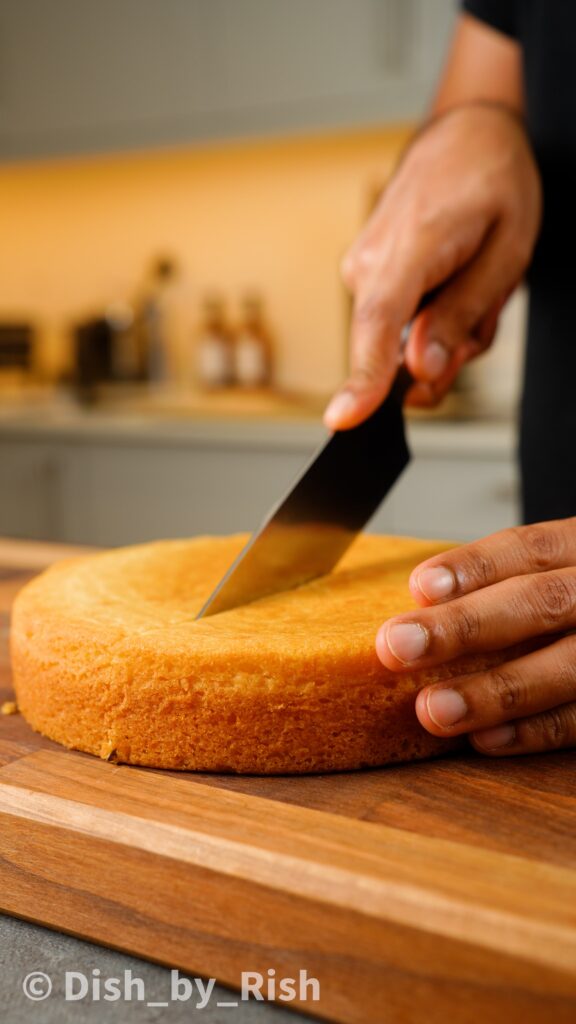
How does eggless baking work?
Whenever I develop an egg free recipe, I’m replacing the function of the egg in various ways. This is why I don’t believe there can ever be one ingredient to replace an egg because it honestly has so many different functions.
In a standard egg based vanilla cake, the eggs will provide structure, richness, flavour, browning, and moisture. They are also the key to a well emulsified batter. In foam based cakes, it’ll also provide the leavening.
In this recipe specifically, we’re using a combination of oil, milk, skimmed milk powder, and 5% fat yogurt to replace some of these functions. From these ingredients we’ll get moisture, flavour, browning, structure, and emulsification of the batter.
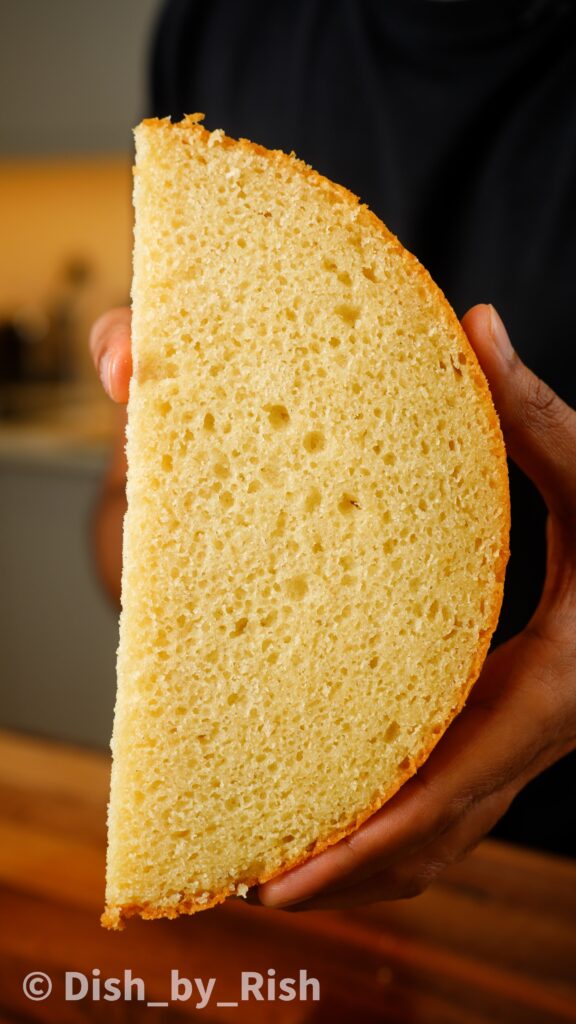
This Egg Free Cake is NOT dry
This recipe is not dry, and it’s also not stodgy. These are common pitfalls with egg free cakes because they lack a huge structural and textural ingredient. That’s why it’s even more important for precision here, which is why I only provide recipes in gram measurements.
The balance of structural ingredients and tenderising ingredients will largely determine the final texture. With this recipe, we have enough fat to add richness and moisture, without impacting the texture. Using a combination of oil and butter is key as oil stays liquid at room temperature, and this is what provides the moisture.
This Egg Free Vanilla Cake has TWO key ingredients
5% Fat Greek Yogurt:
- This adds richness and flavour from the fat content
- It also adds structure due to the protein content
- The yogurt also aids in emulsifying the batter
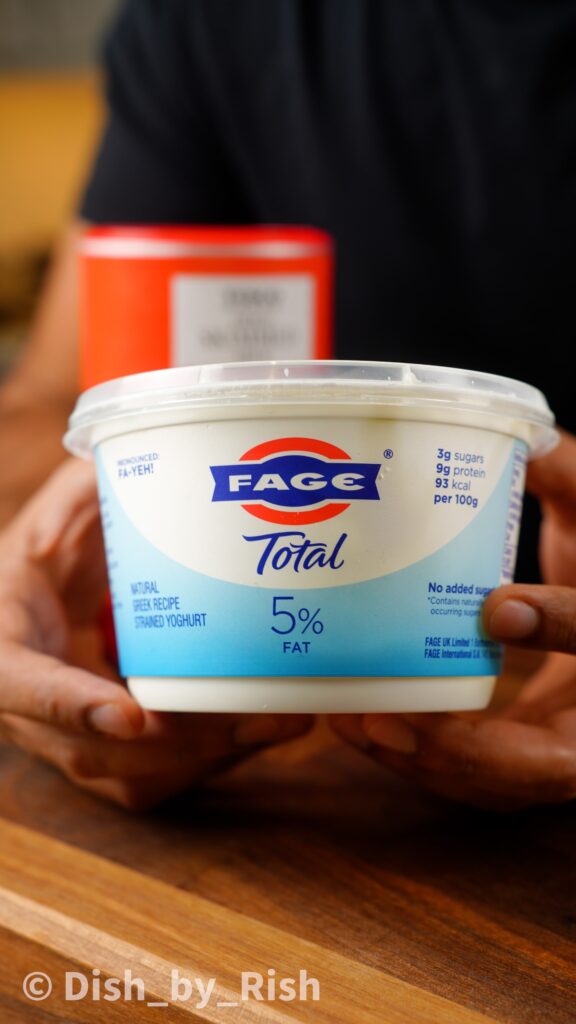
Skimmed Milk Powder:
- The skimmed milk powder will add flavour and help with browning due to the milk solids
- They will also help with structure due to the milk proteins
- Also useful for emulsifying the batter
- Has little fat content in comparison to full fat milk powder which is ideal here. Adding too much fat will ‘weigh’ down the cake batter, leading to a dense cake and a collapsed internal structure
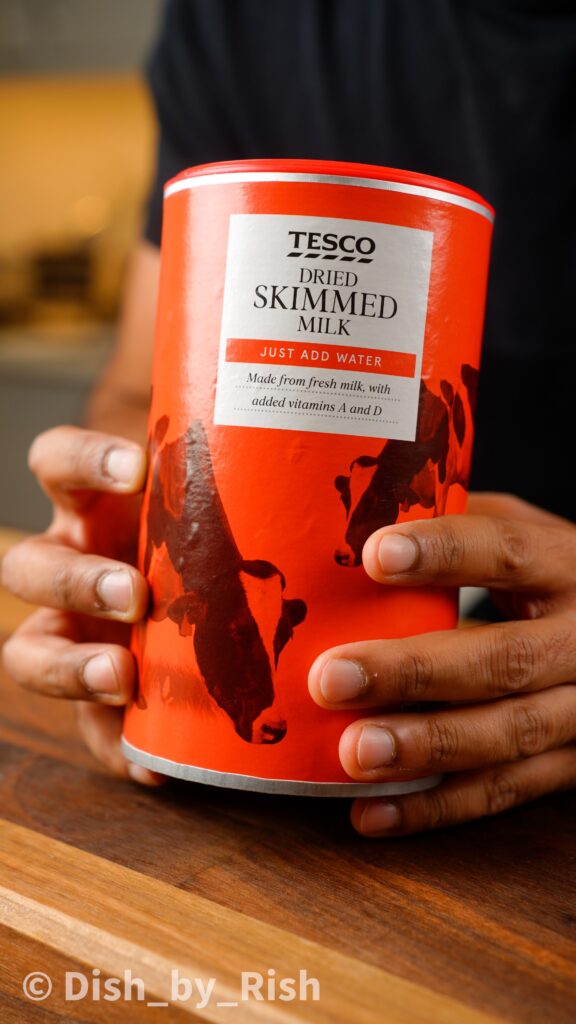
How to get flat egg free vanilla cakes perfect for layering
This recipe does bake up fairly flat on its own, however ovens can vary as well as a whole host of other factors. I personally don’t like trimming cakes, so I tend to use cake strips to ensure an even bake. These strips are soaked in water before being wrapped around the baking tin.
Cake strips provide a more gradual increase in temperature around the outside of the tin, which prevents the side of the cake from baking too quickly. This allows the sides to continue rising for a more flat cake. Doming tends to happen when the sides of the cake bake too quickly whilst the centre is still rising.
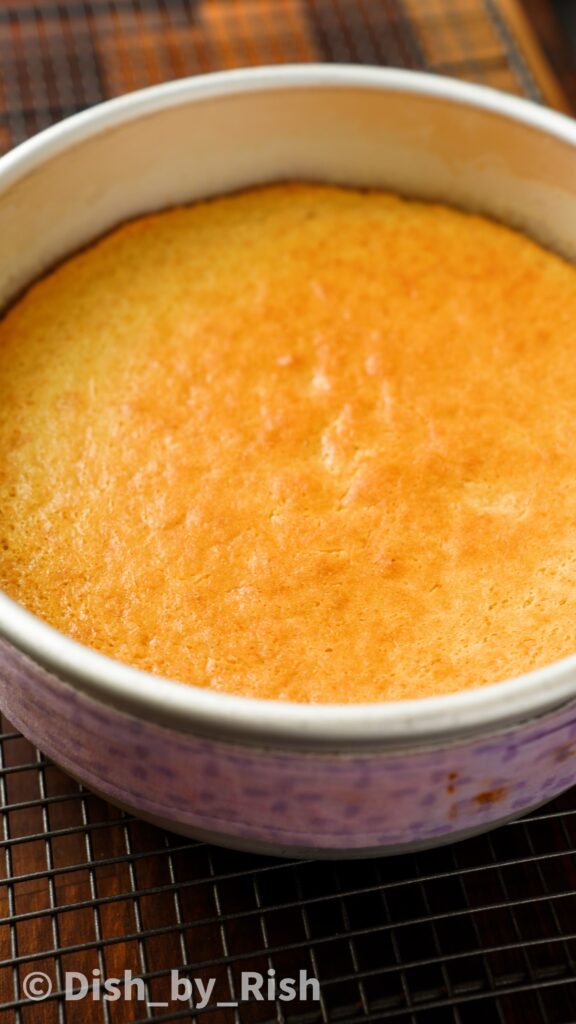
Let’s talk about some of the ingredients
I’ll cover the main ones below but the full recipe can be found at the end
- Plain flour/all purpose flour – I prefer cake flour for my egg-based cakes, but the extra gluten in plain/AP flour provides some necessary structure in egg free baking
- Baking powder – this will be the chemical leaving agent. Note: this is not baking soda/bicarbonate of soda which is just a base and requires an acid activator. Baking powder already contains the base and acid pre-mixed
- 5% Fat Greek Yogurt – see above for more information
- Skimmed milk powder – see above for more information
- Whole milk – this provides flavour, richness, and fat
The KEY tips for making this Egg Free Vanilla Cake
- Use skimmed milk powder and not full fat milk powder – adding too much fat will ‘weigh’ down the cake and cause the internal structure to collapse. This will lead to a dense and stodgy cake
- Whisk the ingredients together very well – especially after adding in the yogurt and milk powder. You want the batter to be smooth and emulsified
- Wrap the cake in clingwrap whilst still slightly warm – then pop the cake into the fridge for at least 2-3hours. This will trap the last bit of steam inside the cake, allowing it to retain extra moisture
How to make this eggless vanilla cake
The images below show how to make one layer but the full recipe at the end is for two 8″ layers

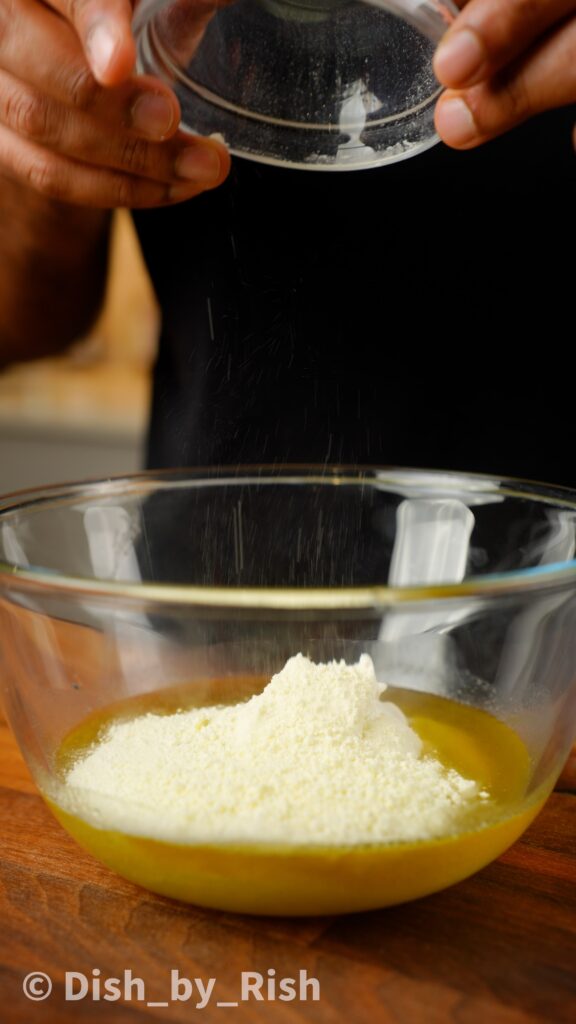
1+2) Start by adding the melted butter, oil, sugar, and vanilla to a mixing bowl. Then, add in the 5% fat yogurt and the milk powder
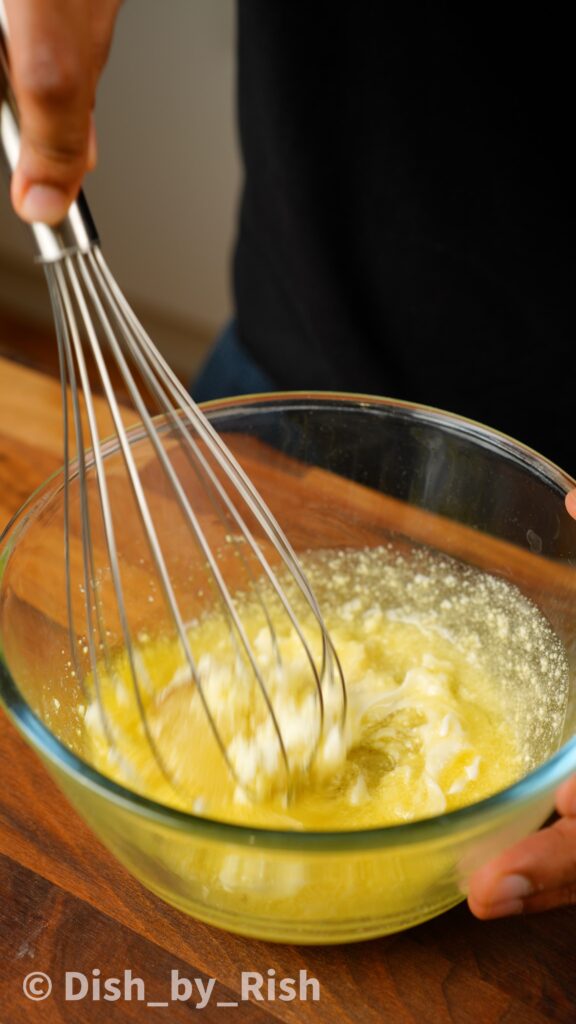
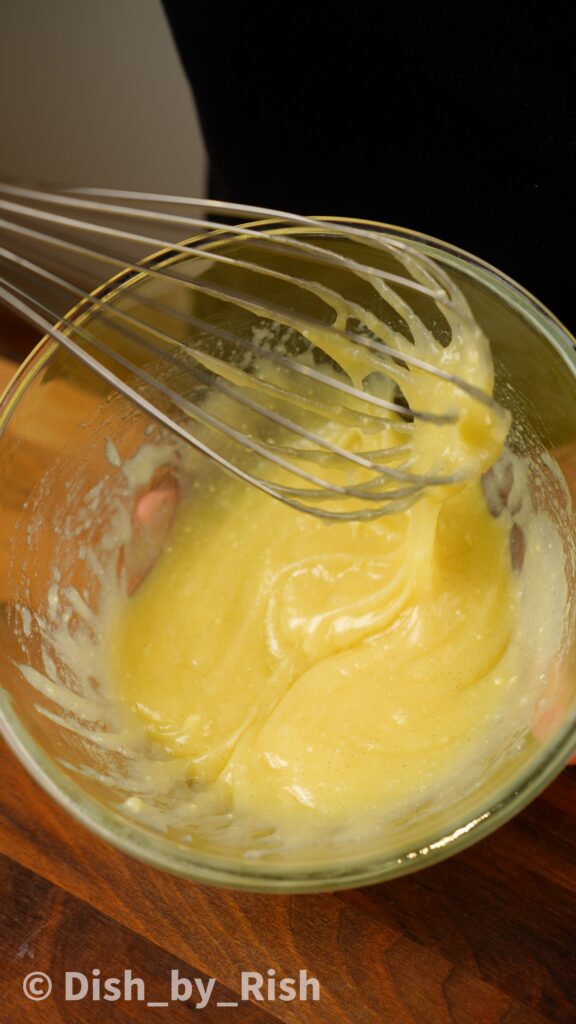
3+4) Whisk the mixture together very well, it will initially look split and curdled but will slowly come together as it emulsifies. It should look smooth and feel slightly thick
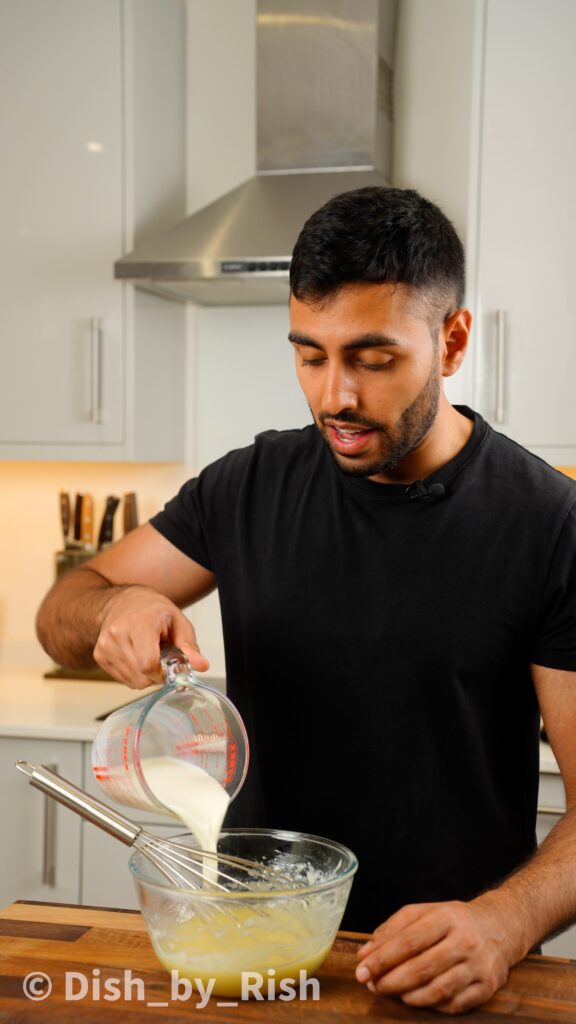
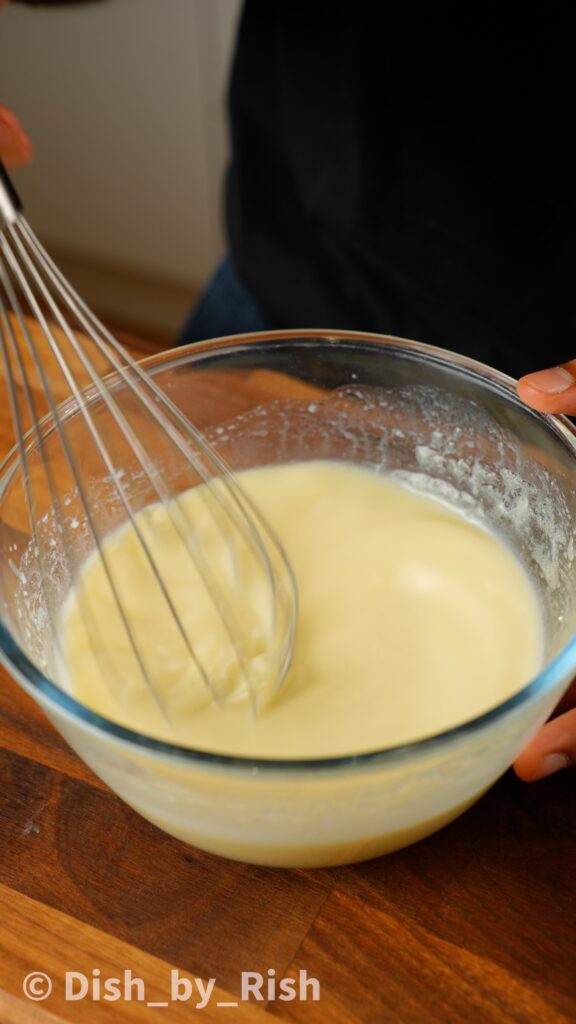
5+6) Next, pour in the milk and whisk well once again
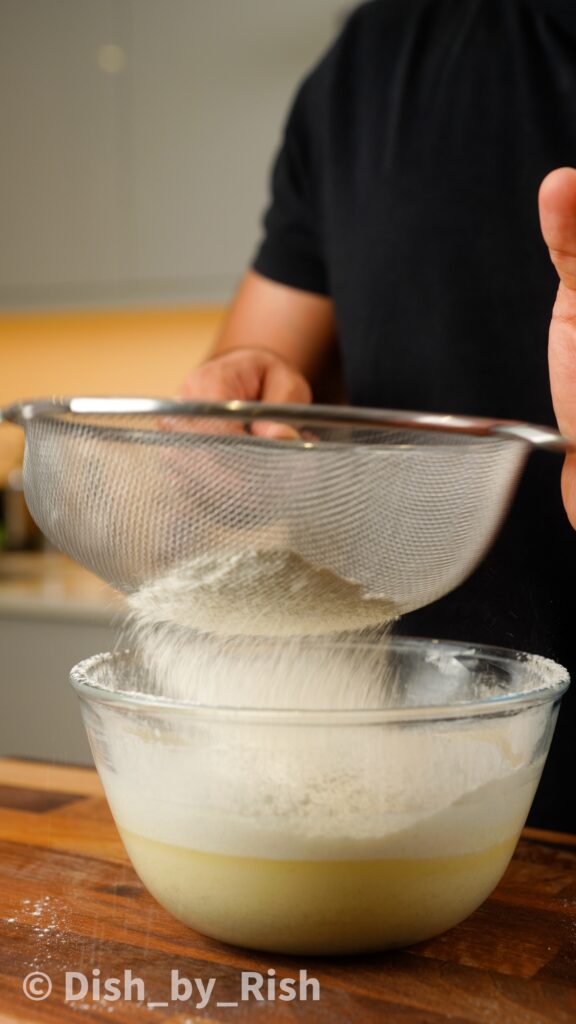
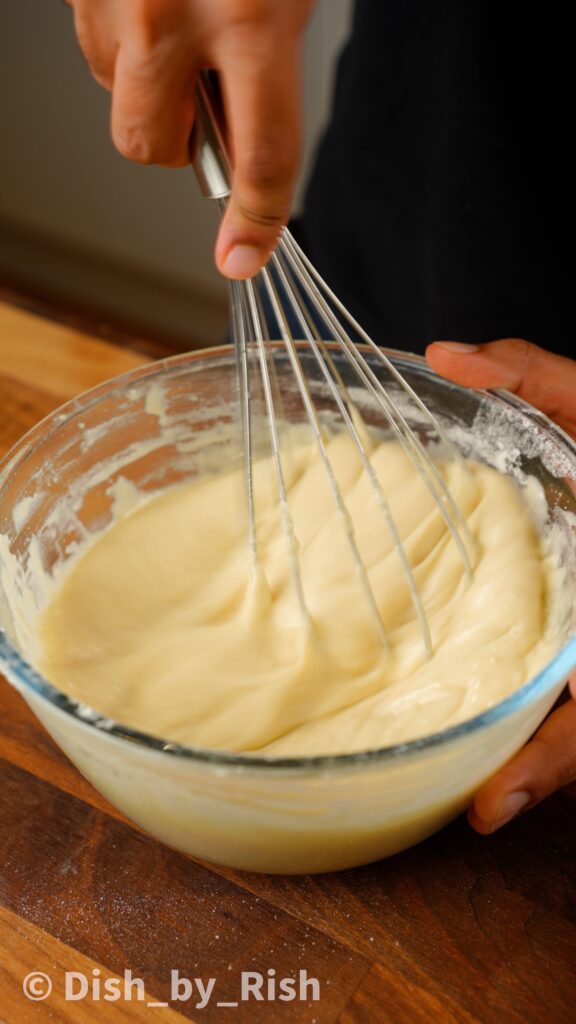
7+8) Sift in all the dry ingredients (the flour, baking powder, and salt). And whisk once again until incorporated

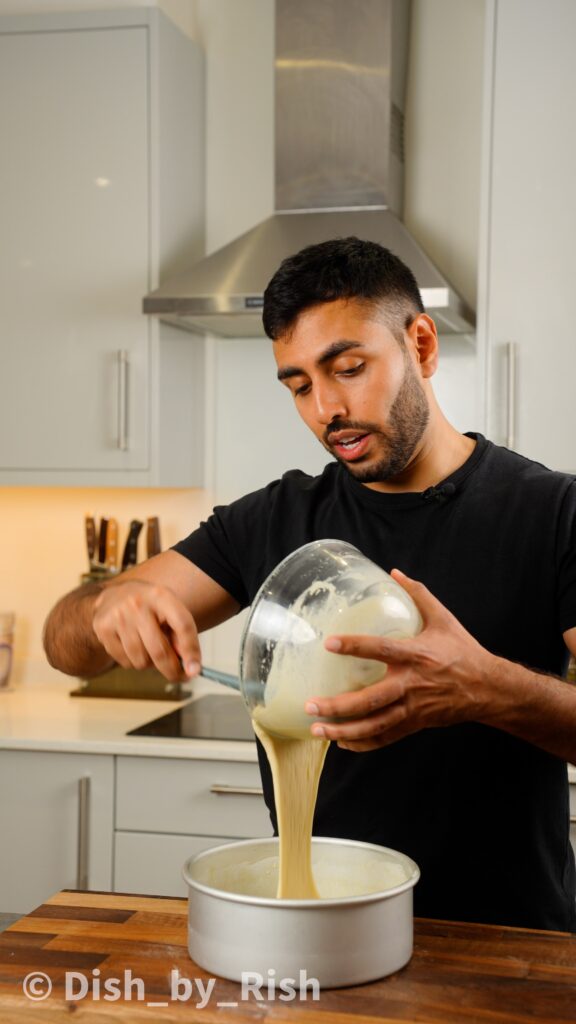
9) The batter should look fairly smooth with a thick flowable consistency
10) Pour the batter into an 8″ greased and lined tin from a slight height, this will help to remove any large air bubbles. Then give the tin a little shake and a gentle tap to level the batter and remove any more air bubbles
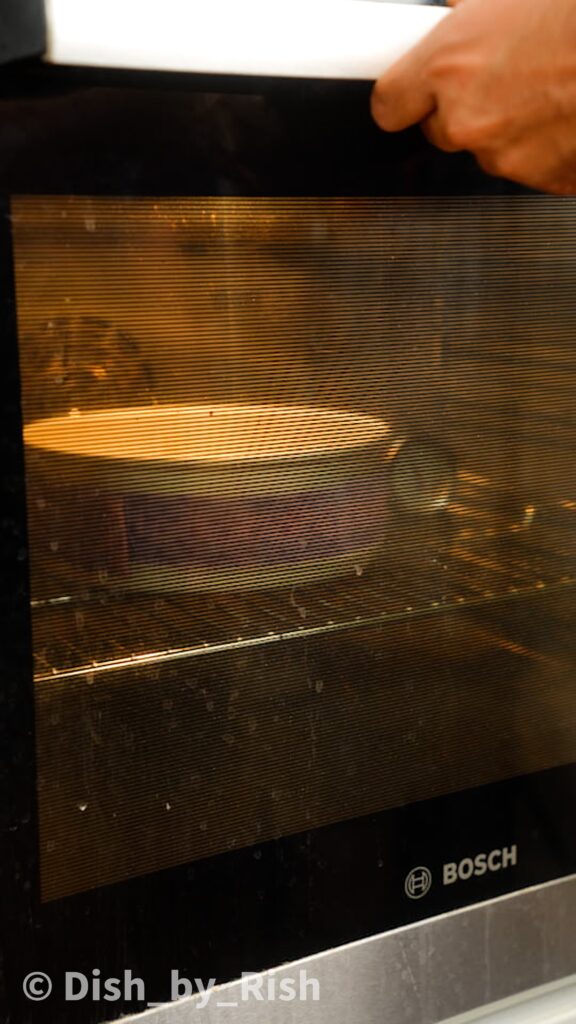
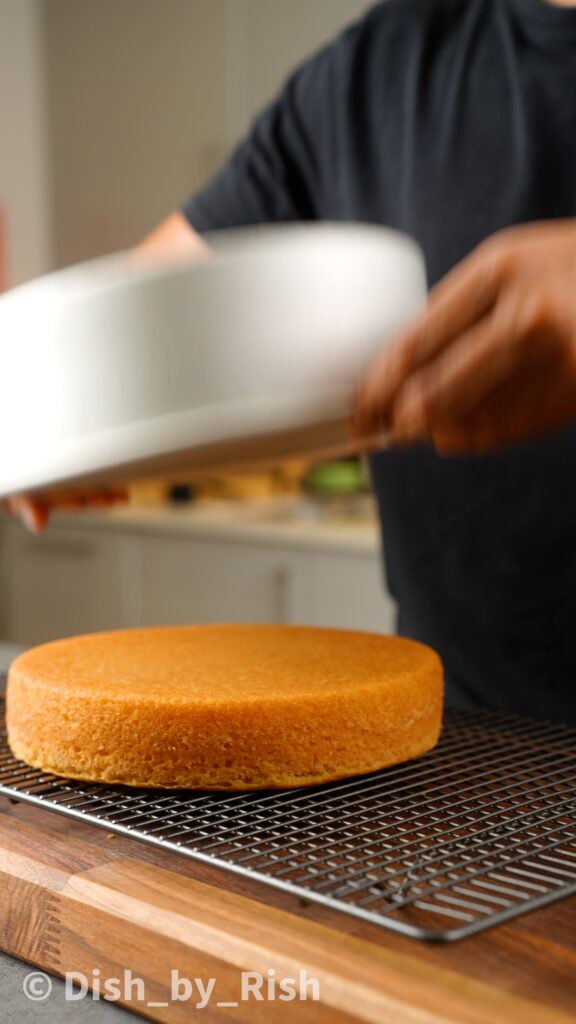
11) Place the cake batter into a preheated oven, the times and temperatures are in the recipe below. I’m using cake strips which helps to achieve a completely flat bake. This is ideal for layering if you’re not a fan of trimming cakes
12)Allow the cake to cool in the tin for 20 minutes, then flip out onto a wire rack and allow to cool completely. OR for my preferred method of choice. Cool for another 15-20 minutes, and whilst still slightly warm to the touch, wrap in clingwrap and place into the fridge for another 2-3 hours. This will trap the last bit of steam inside the cake to add in extra moisture
Frequently Asked Questions
Can this egg free vanilla cake be made vegan?
It should technically work with a plant based butter block, a soy based yogurt, coconut milk powder, and soya milk. However, this is not something I’ve tested as of yet. I’ll update this section in the future once tested.
Can any other type of yogurt be used?
I’ve found the 5% yogurt to lend the best results, quite drastically actually. Some 0% yogurts or natural yogurts can be slightly too acidic, which in my experience impacted the browning and also led to a small premature reaction with the baking powder before the cake reached the oven.
If you enjoyed this recipe
Please do let me know! Leave a review and a rating below, I’d love to know how you got on.
You can also tag me on Instagram at @dish_by_rish. Or follow me on Facebook, Pinterest, Youtube, and TikTok to keep up with all my cooking and baking creations.
Until then, happy baking!
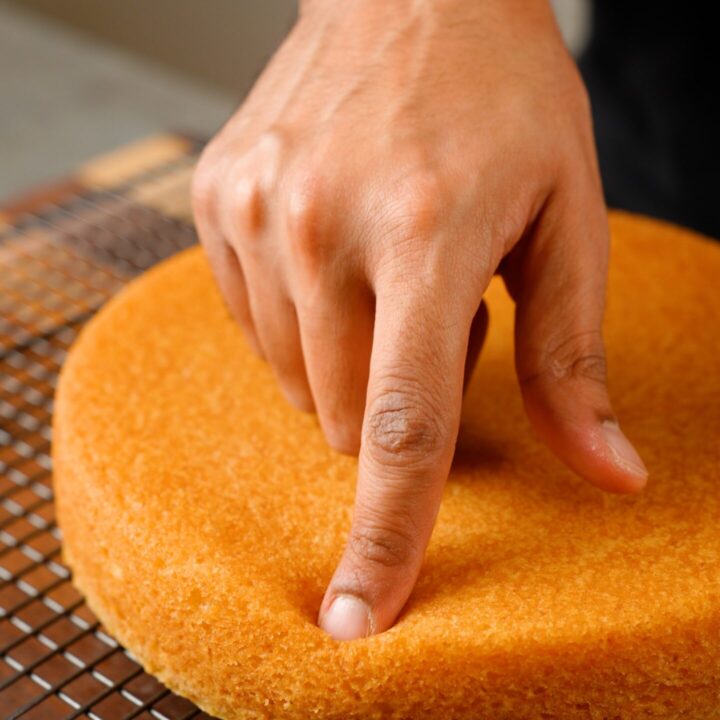
Egg Free Vanilla Cake
This Egg Free Vanilla Cake is buttery, rich, moist, and perfect for a layered cake. It's an easy recipe using pantry friendly ingredients.
Ingredients
- 420g plain flour/all purpose flour
- 18g baking powder
- 1tsp salt
- 90g unsalted butter, melted
- 130g neutral oil, e.g. sunflower/rapeseed/vegetable
- 250g white granulated sugar
- 2tsp vanilla bean paste/extract
- 60g 5% fat Greek yogurt, I use the Fage brand
- 320g whole milk
- 16g skimmed milk powder
Instructions
- Pre-heat your oven to 160'C fan/180'C conventional - 320'F fan/ 355'F conventional
- Start by adding the melted butter, oil, sugar, and vanilla to a mixing bowl. Then, add in the 5% fat yogurt and the milk powder
- Whisk the mixture together very well, it will initially look split and curdled but will slowly come together as it emulsifies. It should look smooth and feel slightly thick
- Next, pour in the milk and whisk well once again
- In a separate bowl, mix together the flour, baking powder, and salt. Then, sift all of these dry ingredients into the wet mix. Whisk until incorporated and then fold the batter over a few times with a spatula to ensure no dry flour remains at the bottom. The batter should look fairly smooth with a thick flowable consistency
- Pour the batter into two 8" greased and floured/lined baking tins. Pour from a slight height, this will help to remove any large air bubbles. Then give the tin a little shake and a gentle tap to level the batter and remove any more air bubbles
- Place the cake tins into the oven and bake for 37-40 minutes, a toothpick or skewer should come out clean. If wet batter remains, bake for a further 5 minutes and test again. I like to use cake strips which help to achieve a completely flat bake. This is ideal for layering if you're not a fan of trimming cakes, but it is not essential
- Allow the cakes to cool in the tin for 20 minutes, then flip out onto a wire rack and allow to cool completely. OR for my preferred method of choice. Cool for another 15-20 minutes, and whilst still slightly warm to the touch, wrap in clingwrap and place into the fridge for a minimum of 2-3 hours. This will trap the last bit of steam inside the cake to add in extra moisture. Let it come back to room temperature before serving/eating
Notes
Frequently Asked Questions
Can this egg free vanilla cake be made vegan?
It should technically work with a plant based butter block, a soy based yogurt, coconut milk powder, and soya milk. However, this is not something I've tested as of yet. I'll update this section in the future once tested.
Can any other type of yogurt be used?
I've found the 5% yogurt to lend the best results, quite drastically actually. Some 0% yogurts or natural yogurts can be slightly too acidic, which in my experience impacted the browning and also led to a small premature reaction with the baking powder before the cake reached the oven.
Nutrition Information
Yield 14 Serving Size 1Amount Per Serving Calories 362Total Fat 16gSaturated Fat 4gTrans Fat 0gUnsaturated Fat 10gCholesterol 16mgSodium 318mgCarbohydrates 50gFiber 1gSugar 20gProtein 5g
Note: This is an automated calculation and hence may not be entirely accurate.
Hi rish,I tired this vanilla cake it is so moist, my kids enjoyed while eating this vanilla cake
Thank you so much for this recipe. This is the most satisfying vanilla cake I have ever baked. It was bang on.
I’m so glad!!! Worked on this one for months, so I love hearing this! Thanks Shruthi!
Thank you for the fabulous egg free vanilla cake recipe; it was rich and buttery and so soft! My son, who is normally picky about his desserts also loved it and asked for seconds.
This cake looks delicious! However, I am trying to reduce dairy products. Have you followed up by trying this recipe without animal products? I don’t want to reinvent the wheel unless I have to.
I haven’t tried this without dairy unfortunately, will update the recipe in the future if I do. Rish
I am going to use this recipe to make a small smash cake for my daughter who has an egg allergy and is turning 1. The little cake tins I got are 4.5 inches and 6 inches, do you have a suggested baking time for pans of this size? Thanks!
Hi there, that sounds awesome! I haven’t tested this recipe on smaller tins, but I’d recommend keeping an eye on them as they bake. You’ll know they’re done when there’s a golden crust on top and a toothpick/skewer comes out clean. Wishing your little one a very happy birthday, Rish
Can you make in advance and freeze?
yes, you can indeed. let it thaw in the fridge overnight before stacking
Hello, I’m definitely trying this recipe for my partners birthday. However I have a gas oven would I use gas mark 4 for 180 or gas mark 3 for 160?
Thank you so much!
hey, it would be gas mark 4. That would be the same as 160’C for fan and 180’C for conventional
Hi Rish
Hiya
Am looking to try this eggless cake recipe – just wondering after reading all comments and instructions – would any of the ingredients such as milk – need to be room temperature? As butter is melted – sorry if you have already mentioned it – and I’ve missed it?
Thanks
Hey Shilpa, yes it’s always best practice to have ingredients at room temperature unless stated otherwise. This allows for a more optimal emulsion of all ingredients. Having said that, I’ve made this with both room temperature and fridge-cold ingredients with no noticeable difference. Hope this helps!
Best, Rish
That’s great Rish
Thanks for getting back quick.
Definitely gonna make it over the weekend – will let you know how it turns out 🙏🏼
Hi Rish, I have tested this recipe many times now and it’s an amazing recipe that I use whenever I want a eggless one or for my vegetarien relatives. Thanks a lot for the recipe.
Have you done this cake with cocoa power or chocolate ? It’s the case what will be the proportion to have a chocolate cake plz
Hi! I am planning to scale this up to make three 10” layers. Per some cake math, that is multiplying your measurements by 2.5.
The issue is I dont think my oven can fit three 10” cake pans on the same rack. My question is: do you think I should (1) bake the three pans on different racks in the oven? (2) make all the cake batter at once but leave one cake pan with batter sitting outside while the other two bake first? OR (3) bake the cakes one at a time and make a new batch of batter each time?
I hope the question makes sense. Thank you so much!
The cake has been a big hit in my family! I couldn’t help but think it tasted a little salty. Could it work without the salt?